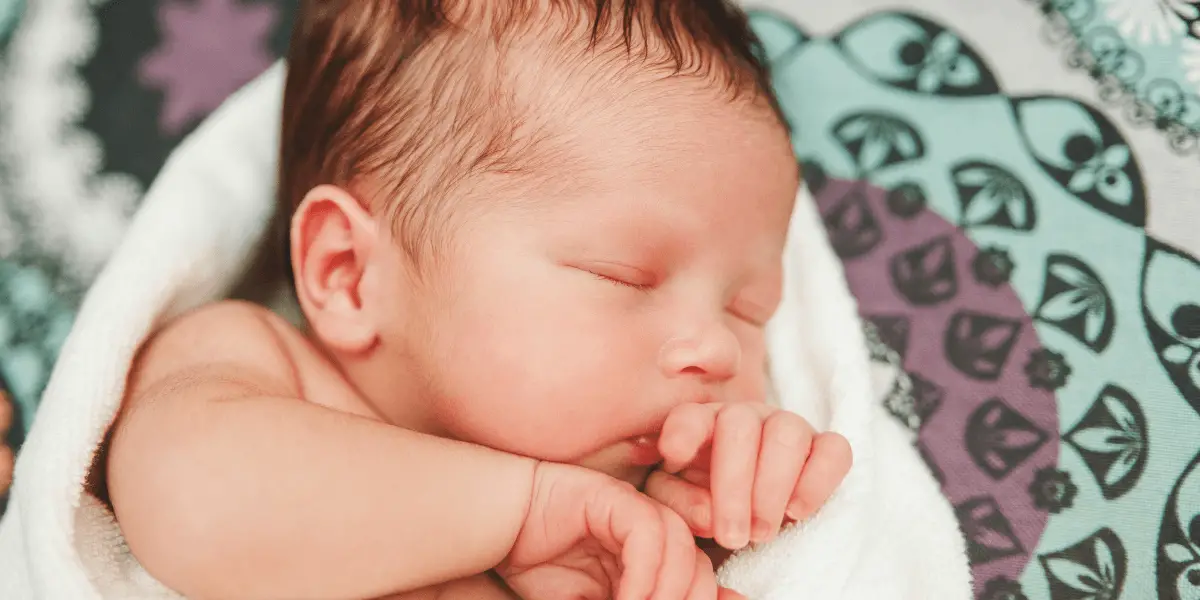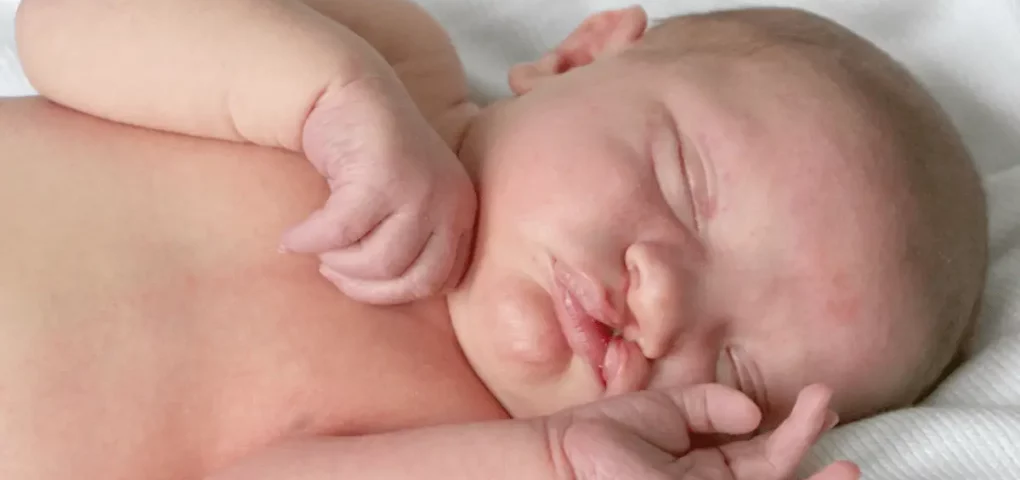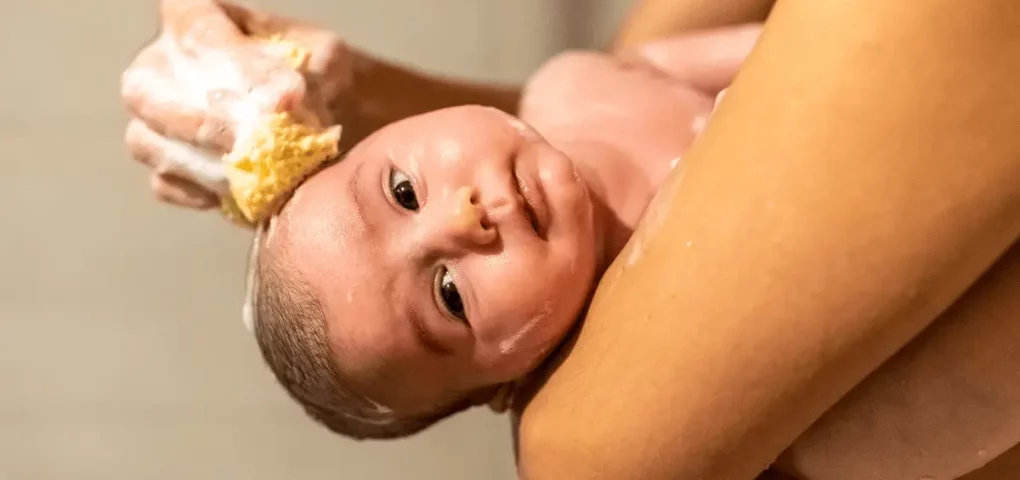
As a new parent, you have a lot of questions. When will my baby sleep through the night? When do babies start teething? When do babies’ sweat glands develop? Sweating is an important bodily function that helps regulate body temperature. It’s something that all babies do, but when does it start?
This article will answer that question and give you some tips on how to keep your baby cool during the summer months.
Understanding Babies’ Sweat Glands
Sweat glands are small tubes in the skin that secrete sweat. There are two types of sweat glands: eccrine and apocrine. Eccrine glands are found all over the body and open directly onto the surface of the skin. Meanwhile, apocrine glands are found in areas with a lot of hair follicles, such as the armpits and groin.
Babies have both types of sweat glands, but the eccrine glands are not fully developed at birth. In fact, they don’t reach full maturity until a child is between two and five years old. The apocrine glands, on the other hand, are fully developed at birth. This is why newborns can sometimes have a strong body odor.
So, when do babies start sweating?
Newborns start sweating as soon as they are born. However, they don’t sweat much because their eccrine glands are not fully developed. When they sweat, it’s usually due to a fever or a hot environment. Babies’ eccrine glands start to develop during the fourth month. Excessive sweating becomes more noticeable starting at four months old.
As your child grows, you’ll notice that they sweat more. This is normal and nothing to worry about. Just make sure to dress them in light, breathable clothing during hot weather and to keep an eye on their body temperature.
This way, you can guarantee that they won’t be victims of excessive sweating that might contribute to sudden infant death syndrome, especially if babies sweat excessively while sleeping.
It’s important for parents to know when their baby’s sweat glands are developed. It can help them to better understand and manage their child’s health. After all, by knowing when babies start to sweat, parents can be sure to monitor their child’s temperature and keep them cool in hot weather.
Is There Any Reason for Concern About a Newborn's Sweat Rate?

There is not usually any cause for concern if a newborn sweats. When they are first born, it’s normal for them to sweat more than usual. This is because their bodies are adjusting to the new environment and temperature.
However, if a newborn is sweating excessively or has other symptoms such as fever, parents should speak to a doctor. Make sure to contact your baby’s doctor ASAP if the core body temperature rises.
If your baby’s entire body becomes cold, there could be a problem with their health, like problems with their nervous system or diseases like congenital heart disease.
Babies start to sweat when they are born, and they start to sweat more around four months old. This is when their eccrine glands, which are responsible for regulating body temperature, start to develop.
Newborns Don’t Sweat Evenly
Newborn babies tend to sweat more on their foreheads, necks, and upper backs. Excessive sweating can also cause sleep apnea and nervous system problems. Sleep apnea and nervous system problems need to be addressed immediately. After all, babies sweating too much are mostly uncomfortable.
The body’s natural response to night sweats or producing sweat would be to reject the situation. For babies, they will tend to cry nonstop. When a baby stops crying, it is usually a sign that conditions have already improved.
Normal heat-sensing neurons are present in the human body. Therefore, it’s important to keep a baby hydrated, especially during deep sleep when body heat is harder to regulate.
Older Babies Can Regulate Their Temperature
As babies get older, their bodies become more efficient at regulating their temperature. This means that they sweat more evenly and don’t usually sweat as much as they did when they were newborns.
However, there are still some situations where babies may sweat more than usual. Make sure to invest in a temperature regulation system to avoid a sweaty baby that is at risk of sleep apnea and other complications.
For example, if a baby is hot from being in a warm environment or from physical activity, they may sweat more than usual. Babies may also sweat more when they are sick or have a fever. When this happens, it’s important to ensure the baby stays cool and hydrated.
In most cases, sweating is nothing to worry about and is simply a sign that your baby’s body is growing and changing. However, it’s always best to err on the side of caution and consult with a doctor if you have any concerns. It’s important to note that even premature babies might sweat. Therefore, baby sweating is something that parents should be attentive to.
After all, baby sweating is manifested in the early weeks of life for babies. The first few weeks might be a bit strange for parents, but once a baby is born, thermal stimuli begin to develop. Therefore, infants and older children need to be monitored just in case they become too sweaty that it affects their health and causes excessive crying.
Tips To Encourage Positive Sweat and Hydration Cycles in Babies

It’s important for parents to encourage positive sweating and hydration cycles in their babies from an early age. Some tips for doing this include:
Making Sure That The Baby Is Well-hydrated
One of the most important things that parents can do to encourage healthy sweating and hydration cycles in their babies is to make sure that they are well-hydrated. This can be done by giving them regular access to water or breast milk. Be attentive to your baby’s cues and offer water or breast milk when they seem thirsty.
Encouraging Them To Get Some Exercise Every Day
Another great way to encourage healthy sweating and hydration cycles in babies is to encourage them to get some exercise every day. This can be done by playing with them and encouraging tummy time. As babies get older, you can also encourage them to crawl, stand, and walk.
Taking Regular Baths

Baths are another great way to encourage healthy sweating and hydration cycles in babies. When giving your baby a bath, use lukewarm water and avoid using soap on their face or genitals. You can also add a few drops of lavender oil to the bathwater to help soothe and relax your baby.
Dressing the Baby in Loose, Cool Clothing
Another way to encourage healthy sweating and hydration cycles in babies is to dress them in loose, cool clothing. When it’s hot outside, dress your baby in light-colored, loose-fitting clothes. You should also avoid dressing your baby in too many layers of clothing, as this can make them sweat more.
Avoiding Over Bundling the Baby
Parents must also avoid over-bundling the baby when it’s cold outside. When layering your baby’s clothes, always make sure that their chest is covered. You can also put a hat on your baby to help keep them warm. Avoid using a heavy blanket or quilt when putting your baby to sleep, as this can cause them to overheat.
Monitoring the Baby’s Room Temperature
It’s also important to monitor the temperature of your baby’s room. The ideal room temperature for a sleeping baby is between 68 and 72 degrees Fahrenheit. When the room is too hot or too cold, it can cause the baby to sweat.
You can use a thermometer to check the room temperature. If the room is too hot, you can open a window or turn on a fan. If the room is too cold, you can add an extra layer of clothing to your baby or use a space heater.
Monitor Their Diaper Output To Make Sure They’re Not Dehydrated
If your baby is sweating a lot, it’s important to monitor their diaper output. A good way to tell if your baby is dehydrated is by checking their diapers. If they are producing less urine than usual, or if their urine is darker than normal, this could be a sign of dehydration.
When babies sweat, they lose not only water but also electrolytes like sodium and potassium. These electrolytes are essential for their body to function properly. If your baby is dehydrated, they may be irritable, have a dry mouth, or have sunken eyes.
It’s crucial for parents to encourage positive hydration habits in their babies so that they can avoid dehydration. Dehydration is very dangerous for babies and can even lead to death. Therefore, parents must take a proactive approach to ensure their baby stays hydrated.
Signs That Your Baby Is Overheating

There are some signs that you can look for to tell if your baby is overheating. These include:
Flushed or Red Skin
One of the most obvious signs that your baby is overheating is if their skin becomes flushed or red. If you notice this, take your baby out of the heat and into a cooler environment immediately.
Excessive Sweating
Another sign that your baby is overheating is if they are sweating more than usual. Babies normally don’t sweat much, so if you notice they are sweating excessively, it’s a sign that their body is trying to cool itself down.
Increased Heart Rate
If your baby’s heart rate is increased, it’s another sign that their body is overheating. You can check your baby’s heart rate by feeling the pulse on their chest or neck.
Rapid Breathing
If your baby is breathing faster than normal, it’s another sign that their body is overheating. You can check your baby’s breathing by watching their chest rise and fall.
Change in Behavior
If you notice a change in your baby’s behavior, it could signify heat exhaustion. Your baby may be irritable or fussy and may not want to eat.
If you notice any of these signs, take your baby to a cooler environment and remove any excess clothing they may be wearing. If their symptoms don’t improve, seek medical attention immediately.
Babies are more susceptible to heat-related illness because their sweat glands haven’t developed fully yet. When the outside temperature is hot, humid, or both, babies can’t cool themselves off as efficiently as adults.
That’s why it’s so important for parents to be aware of the signs of heat-related illness in babies and how to prevent it. This way, you can keep your little one cool, comfortable, and safe all summer long.
Examples of Heat-related Illnesses in Babies
There are several heat-related illnesses that can affect babies, but the three most common are:
Heat Stroke
This is the most serious form of heat-related illness. Symptoms include a high body temperature (above 103°F), hot, red, dry skin, a fast heartbeat, and difficulty breathing. If untreated, heat stroke can lead to unconsciousness and even death.
If you think your baby has a heat stroke, call 911 immediately and cool their skin with lukewarm water (not cold or ice water) while waiting for medical help.
Heat Exhaustion
Heat exhaustion is less serious than heat stroke but can still be dangerous. Symptoms include a high body temperature (above 103°F), heavy sweating, fast breathing, headache, nausea or vomiting, dizziness or fainting, and tiredness or weakness.
If you think your baby has heat exhaustion, move them to a cooler place and remove any excess clothing. Give them small sips of water or an electrolyte solution if they’re old enough to drink it. You can also wet their hair and clothes with lukewarm water. Don’t give them cold drinks, as they can cause stomach cramps. If their symptoms don’t improve within 30 minutes, call your doctor.
Dehydration
Dehydration is a more serious condition that can occur if someone doesn’t drink enough fluids or loses too many fluids. Symptoms of dehydration include a dry mouth and throat, decreased urination, sunken eyes, tiredness or weakness, and dizziness or lightheadedness.
Dehydration can be especially dangerous for babies and young children because they have a small amount of body water to begin with. If they lose too much, they can develop serious complications quickly.
If you think your baby or child is dehydrated, call your doctor right away. They will likely recommend that you give them fluids by mouth, either in the form of breast milk or infant formula if they’re young, or water or juice if they’re older.
You can also try to prevent dehydration by ensuring your baby or child drinks enough fluids during the day. If it’s hot outside, have them drink extra fluids and take breaks in the shade. And if they have diarrhea or vomit, give them small sips of fluid often to prevent dehydration.
It’s also important to know that some babies sweat more than others. This is usually nothing to worry about, but if you notice your baby is sweating a lot, especially if they’re not hot or active, it could be a sign of a medical condition. So, if you have any concerns, always talk to your doctor.
Liquid Nourishment Outside of Breastmilk or Formula
Once your baby starts solid foods, they’ll get some of the water they need from their food. When they eat fruits and vegetables, they’re getting not only fluids but also essential vitamins and minerals.
As long as you’re making sure your baby or child is drinking enough fluids during the day, there’s no need to give them water in addition to their regular meals and snacks. In fact, too much water can actually interfere with a baby’s ability to absorb the nutrients they need from solid food.
Plain water is always the best choice if you want to give your baby liquid nourishment outside of breastmilk or formula. You can start giving your baby small amounts of water (no more than four ounces at a time) once they start solid foods. When they’re a bit older, you can offer them water with meals and snacks. Just be sure to avoid adding sweeteners or flavoring to their water.
It’s also important to keep in mind that even though your baby may be able to drink from a cup, they still need you to provide most of their nutrition. Breastmilk or formula should be the mainstay of their diet until they’re at least a year old. After that, cow’s milk can be introduced.
Is Night Sweat Normal for Babies?
Babies can also sweat at night, and this is perfectly normal. In fact, it’s often the first sign that a baby’s sweat glands are starting to work. Night sweats are caused by an increase in body temperature, and they usually happen when a baby is bundled up too tightly or is sleeping in a room that’s too warm.
If your baby is sweating at night, try to keep their sleeping environment cool and dress your baby in loose-fitting clothing. If the sweating persists or is accompanied by other symptoms, such as a fever, rash, or diarrhea, it’s best to consult your pediatrician.
These cases usually resolve on their own, but it’s always best to err on the side of caution and have your baby checked out by a doctor.
Why Do Babies Sweat While Sleeping?
Babies sweat while sleeping for the same reasons that adults do: to regulate their body temperature. When we sleep, our bodies can regulate our internal temperature better because we’re not moving around and generating heat.
However, babies don’t have fully developed sweat glands, so they can’t sweat as efficiently as adults. This means that they’re more likely to overheat, which can lead to sweating.
How Can I Keep My Baby Cool While Sleeping?
There are a few things you can do to help keep your baby cool while sleeping:
- Dress them in light, breathable clothing.
- Use a fan in the room to circulate air.
- Keep the room temperature cool, but not too cold.
- Monitor your baby for signs of overheating, such as sweating or flushed skin.
- If your baby is sweating, you can try to help them cool down by removing some of their clothing.
- It’s also important to make sure that your baby is getting enough fluids.
By following these tips, you can help keep your baby cool and comfortable while they sleep.
How Can I Keep My Baby Comfortable During Summer?
Summer is a great time to enjoy the outdoors with your family. However, it’s essential to take precautions to ensure that your baby stays cool and comfortable in the heat.
Here are a few tips to make sure that your baby stays safe even during the hottest months of the year:
Never Expose Your Baby To Direct Sunlight for More Than a Few Minutes
One of the best ways to keep your baby comfortable during summer is to ensure they’re not exposed to direct sunlight for more than a few minutes at a time.
If you’re going to be outdoors with your baby, make sure to use a stroller with a canopy or umbrella to protect them from the sun’s harmful rays.
You can also dress your baby in light, loose-fitting clothes covering their arms and legs to protect them from the sun. Otherwise, apply sunscreen with an SPF of at least 15 to any exposed areas.
Avoid Spending Time Outdoors During the Hottest Part of the Day
Another way to keep your baby comfortable during summer is to avoid spending time outdoors during the hottest part of the day, which is usually between 11 am and 2 pm. Try to plan your outdoor activities for early morning or evening when the weather is cooler.
If you must go out during the day, try to find a shady spot for your baby, such as under a tree or in a stroller with a canopy. This way, you can still enjoy some time outdoors without exposing your baby to the harsh summer sun.
Dress Your Baby in Lightweight and Loose-fitting Clothing
To help your baby stay cool during summer, dress them in lightweight and loose-fitting clothing. Natural fabrics like cotton are a good choice because they’re breathable and won’t trap heat against your baby’s skin.
Avoid Using Heavy Blankets or Quilts
On hot summer nights, it’s tempting to bundle up your baby in a heavy blanket or quilt. However, this can actually make your baby too warm and cause them to sweat during the night. Instead, use a light cotton sheet to keep your baby comfortable.
Monitor Your Baby’s Room Temperature
To help your baby stay cool and comfortable, monitor the temperature in their room. During the summer months, the ideal room temperature for a baby is between 68 and 72 degrees Fahrenheit.
Use Air Conditioning When Possible
Another way to keep your baby cool during the summer is to use air conditioning when possible. If you have central air conditioning in your home, set it to a comfortable temperature for your baby. When you’re out and about, try to find cool and air-conditioned places, such as shopping malls or movie theaters.
Regardless of how fun you think summer is, it can be a difficult time for babies. You can help your baby stay cool and comfortable all season long by taking some simple precautions.
Some babies tend to vomit when they get too hot. Call the doctor immediately if your baby is vomiting, has a fever, or seems especially irritable. These could be signs of heat exhaustion or dehydration.
Conclusion
Babies can sweat as soon as they are born. However, their eccrine glands develop at four months old. At this time, they’re not very efficient, so you’ll often see a baby’s head and neck drenched in sweat while the rest of their body remains dry.
Kids fully develop their sweat glands by the time they reach six months old. In the meantime, try to keep your baby cool and comfortable during the hot summer months. If you have any concerns, don’t hesitate to call your pediatrician.


Leave a Reply